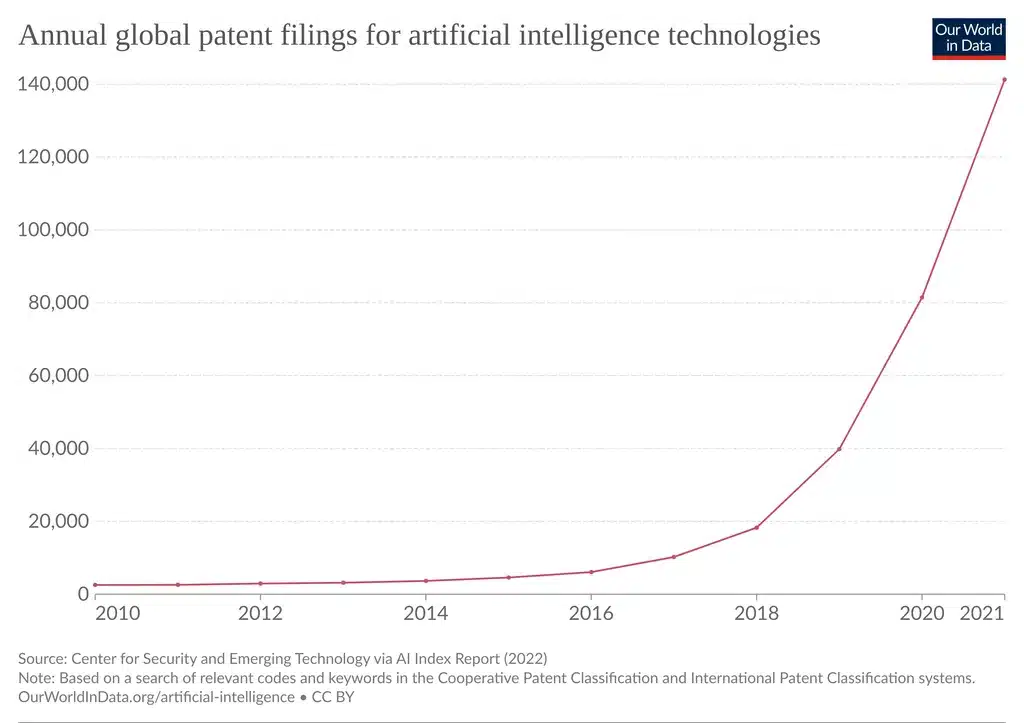Artificial Intelligence
Artificial Intelligence explained – Part 3: Society
17 Aug 23
What is artificial intelligence (AI)? What is the story behind ChatGPT? Where do we find AI in our everyday life? What are the most modern applications? And what does the “AI revolution” mean for us as a society?
We address these questions in our “Understanding AI” blog mini-series: In previous parts, we provided an overview of the technical basics and highlighted specific use cases.
In this third part, we will now discuss societal implications of AI.
A „Printing Press Moment“
“We think it can be a printing press moment,” said Sam Altman, CEO of OpenAI and creator of ChatGPT, at a hearing on AI before the U.S. Senate in May. In doing so, he compared the current development AI field to the invention of the printing press – one of the most influential technological revolutions of the last millennium.
Indeed, the development of AI technology in recent years is impressive: current AI systems are solving increasingly complex problems and can generate not only human text, but also high-quality images based on simple descriptions.
Also, people’s interest in the topic continues to grow rapidly. This can be seen, among other things, in the steep increase in patent applications for AI technology over time, which can be observed in Figure 1 (and the graph does not even include the years 2022 and 2023, which are likely to have brought another acceleration thanks to ChatGPT).

If Altman is right and we are indeed dealing with a printing press moment, then we as humanity – like the stick figure in Figure 2 – are in for a technical development surge that will dwarf everything that has gone before.

It is clear that such historical moments of major change can always have two sides: Enormous opportunities – but also great risks.
Opportunities …
Today’s AI systems are already solving problems that humanity has long struggled with: “AlphaFold” from DeepMind, for example, succeeded in overcoming the decades-long challenge of accurately predicting 3D protein structures based on their amino acid sequences. This enables great efficiency gains in medical research and drug development.
Thinking ahead to systems that can not only predict protein structures, but possibly show a broader intelligence and work many times faster than the best human brains, we can hope for breakthroughs in even more complex problems such as cancer or climate change.
In addition to these positive scenarios, however, there are also dangers associated with AI development.
… and Risks
In the short term, and considering already existing technology, questions arise, for example, about how to deal with disinformation. For example, this image recently circulated on social media:

The photo shows Pope Francis wearing a very unusual jacket. It turned out that the image was generated by the AI system “Midjourney”. Such amazingly genuine “deepfakes” (fakes using deep-learning technology) can be problematic for society, as they fundamentally question our trust in visual information.
And that’s not all: negative scenarios can also be explored further.
Recently, experts have increasingly warned that AI could even pose existential risks.
Indeed, if humans were to be replaced as the most intelligent and thus dominant species on the planet – which seems at least plausible given the course of AI development – it is possible that the same unpleasant fate awaits humanity as it has for so many non-dominant species before us.
The Center for AI Safety from the USA formulated a concise statement in this regard, which was signed by tech greats like Bill Gates, Sam Altman or Geoffrey Hinton (the “Godfather” of Deep Learning):
Mitigating the risk of extinction from AI should be a global priority alongside other societal-scale risks such as pandemics and nuclear war.
Given these extreme future scenarios – both positive and negative – it seems clear that AI deserves the greatest possible societal attention. Not only in terms of safe technical development, but also specifically in terms of political management, cooperation is needed between a wide range of institutions and agencies, as Sam Altman also noted at the Senate hearing as a very good summary:
“Artificial intelligence has the ability to improve nearly every aspect of our lives but also […] creates serious risks that we have to work together to manage.”
Do you have ideas or questions about the social implications of AI? Do not hesitate to get in touch with us.
share